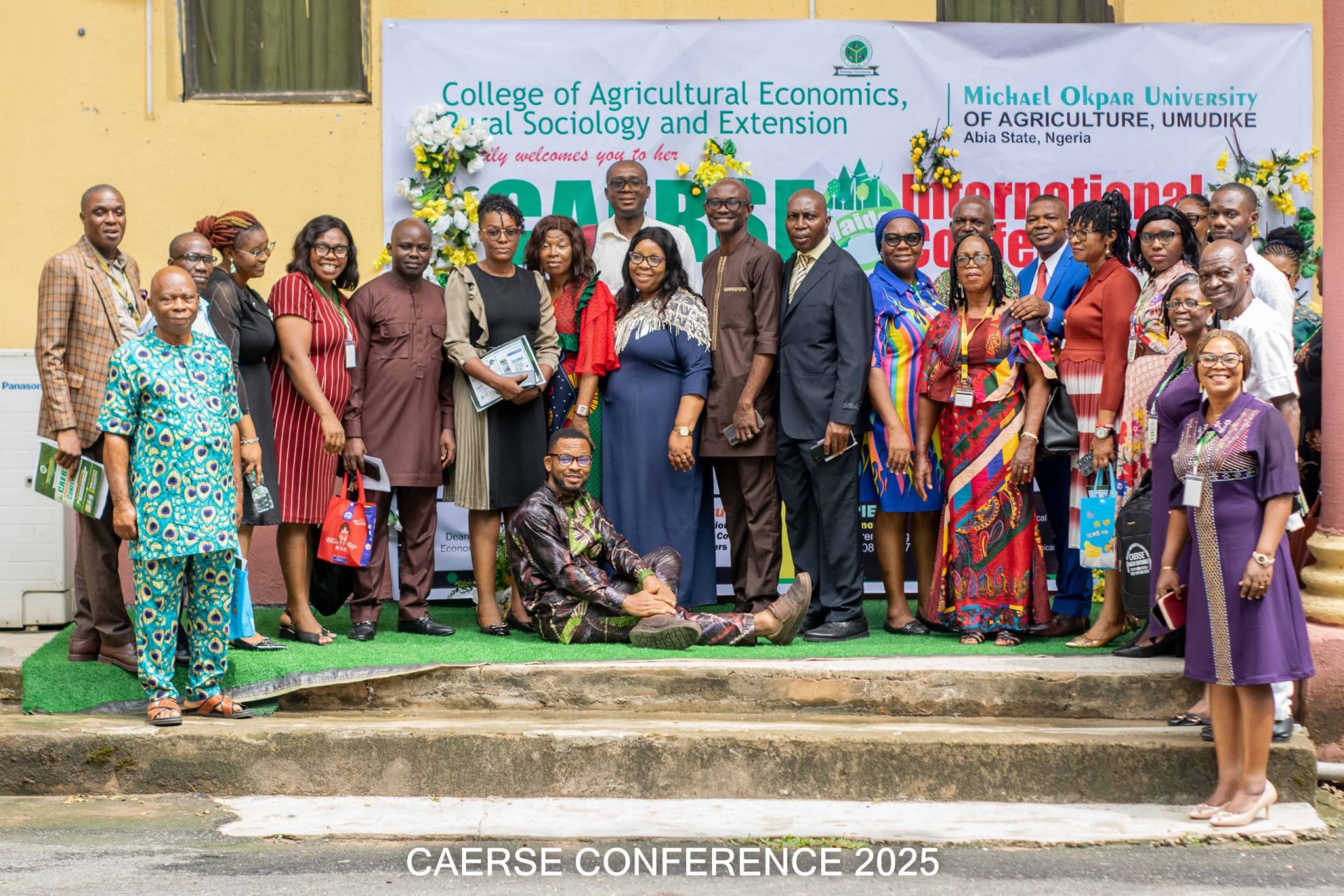The College of Agricultural Economics, Rural Sociology and Extension (CAERSE), Michael Okpara University of Agriculture, Umudike (MOUAU), has held its maiden International Conference at the institution, highlighting the urgent need to enhance food security in the face of climate change challenges.
Declaring the event open, the Vice-Chancellor, MOUAU, Prof. Maduebibisi Ofo Iwe, described the conference theme, “Food Security and Climate Change: Nigeria’s Contemporary Socio-Political and Technological Environment,” as timely and relevant.
Represented by the Deputy Vice-Chancellor (Academics), Prof. Nneoma Elechi Obasi, Prof. Iwe emphasized that the country’s insecurity is closely linked to food insecurity, urging stakeholders to address the root causes.
He decried the declining quality of food across Nigeria, largely due to limited funding, and expressed optimism that the conference would offer viable solutions to issues surrounding food insecurity, climate change, and national safety.

In his welcome address, Dean of CAERSE, Prof. Nnanna Mba Agwu, called for increased collaboration among researchers to develop sustainable responses to food insecurity driven by climate change.
Citing projections that Nigeria’s temperature could rise by 2.9°C to 5.7°C by 2100, he referenced the 2022 ND-GAIN Index, which ranks Nigeria 157th out of 187 countries in terms of climate vulnerability and readiness.
He emphasized the nation’s exposure to extreme weather conditions and underscored the importance of academic discourse in formulating appropriate strategies.
Delivering the keynote address, Abia State Commissioner for Agriculture, Dr. Cliff Agbaeze, advocated for climate-smart agriculture as a critical strategy in ensuring food security and driving sustainable economic development in Nigeria.
Speaking on “Ensuring Food Security in the Midst of Climate Change: A Panacea for Nigerian Economic Development,” Dr. Agbaeze highlighted the harsh impacts of climate change on agriculture and called for the adoption of resilient policies and innovative technologies. He commended MOUAU for spearheading academic innovation and applauded the leadership of Prof. Iwe and Prof. Agwu.
He reiterated Abia state government’s commitment to sustainable farming practices, citing Governor Alex Otti’s initiatives promoting environmental protection, traceability, and global compliance in agriculture.
Speaking virtually from Russia, Prof. Galina V. Astratova of the Federal University emphasized the need for greater investment in Nigeria’s agricultural and industrial complex.
In her lecture, titled; “Geopolitical Pressures and Policy Complexities for Russian and Nigerian Food Security,” she called on the Nigerian government to pursue agricultural self-sufficiency.
She described the agro-industrial sector as pivotal to economic growth and national development, urging authorities to embrace digital transformation and strategic policy shifts to ensure future food security.
Fielding questions from newsmen, the Deputy Dean of CAERSE, Dr. Blessing Ada Ahamefule, stressed the importance of sustainable agriculture and environmental resilience.
She identified organic farming as a vital tool to combat climate change and food insecurity.
“Organic farming is not just an agricultural method—it is a holistic system that respects natural cycles, reduces harmful chemical usage, and supports biodiversity,” she noted.
Dr. Ahamefule also highlighted the climate benefits of organic farming and called for institutional support for organic agriculture through training, certification, and improved market access.
In their goodwill messages, the Abia State Coordinator, Federal Ministry of Agriculture, Dr. Alloysius Chibuzor Mbah, and Head of Station at the Humid Forest Research Institute, Umuahia, Dr. Afoke Koyeso, described food security as a fundamental human right.
They warned that climate change poses a severe threat to food production and access, calling for a holistic approach that includes sustainable agriculture, climate-resilient infrastructure, and social protection programmes.
In her vote of thanks, the Chairperson of the Conference Organizing Committee, Prof. Judith B. Simonyan, expressed appreciation to the Vice-Chancellor, invited speakers, students, and participants for their contributions and active involvement.
She noted that their collective efforts ensured the success of the event and expressed hope that subsequent editions of the conference would be more impactful.
The event also featured plenary sessions, academic paper presentations, and the conferment of awards to distinguished scholars and researchers.

























